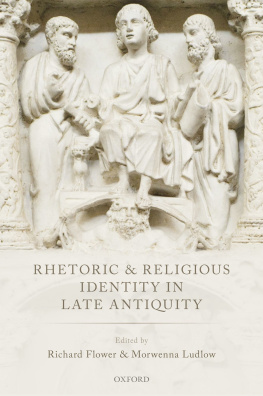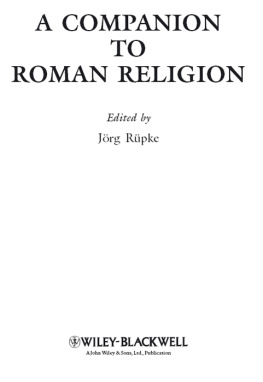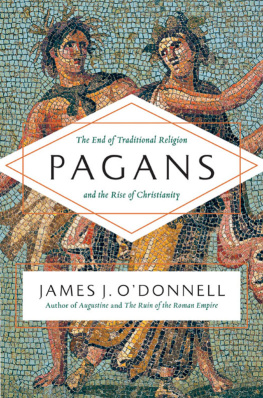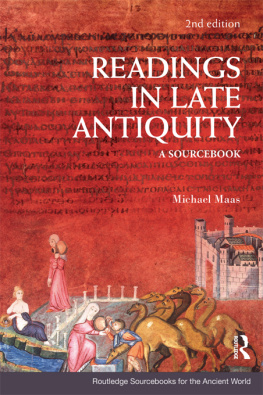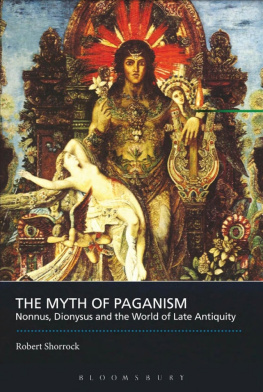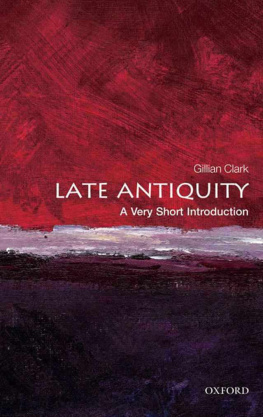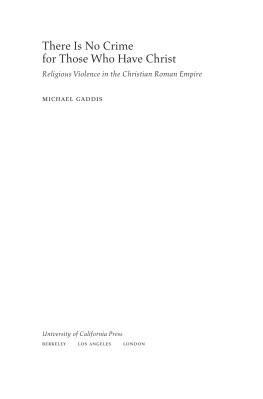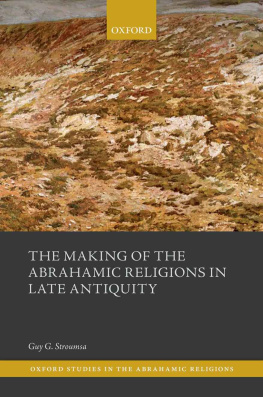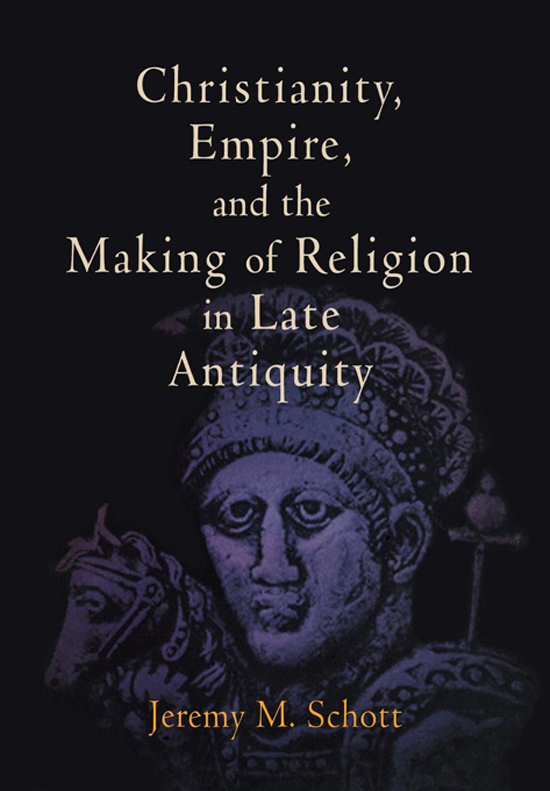Christianity, Empire, and the Making of Religion in Late Antiquity
DIVINATIONS:
REREADING LATE ANCIENT RELIGION
Series Editors: Daniel Boyarin, Virginia Burrus, Derek Krueger
A complete list of books in the series is available from the publisher.
Christianity, Empire, and the Making of Religion in Late Antiquity
JEREMY M. SCHOTT

University of Pennsylvania Press
Philadelphia
Copyright 2008 University of Pennsylvania Press
All rights reserved. Except for brief quotations used for purposes of review or scholarly citation, none of this book may be reproduced in any form by any means without written permission from the publisher.
Published by
University of Pennsylvania Press
Philadelphia, Pennsylvania 19104-4112
Printed in the United States of America on acid-free paper
10 9 8 7 6 5 4 3 2 1
Library of Congress Cataloging-in-Publication Data
Schott, Jeremy M., 1977
Christianity, empire, and the making of religion in late antiquity / Jeremy M. Schott. p. cm. (Divinations)
Includes bibliographical references (p.) and index.
ISBN 978-0-8122-4092-4 (alk. paper)
1. Church historyPrimitive and early church, ca. 30600. I Title.
BR165.S398 2008
To Michelle
For nothing is stronger or better than this: when two people, united in purpose, make a home together. It brings much pain to their enemies, but joy to their friends, and they themselves know the greatest blessings.
Homer Od. 6.18285
Contents
Introduction
Identity Politics in the Later Roman Empire
In 299 C.E. things were going well for Diocletian. His political experiment in tetrarchy had paid off. Maximian and Constantius I had defeated the usurper Carausius in Gaul and Britain. Meanwhile, Diocletians Caesar, Galerius, had defeated the Persians and concluded a treaty that promised to secure the eastern borders. A pious man, Diocletian attended auguries following his recent successes. These sacrifices did not go as planned. Despite repeated attempts, the haruspices were unable to read the entrails of the sacrificial victims. Somehow, either by suspicion or by seeing it himself, the chief haruspex identified the problem: profane peoplethe Christianswere interfering with the rites.
To an empire in control of vast territory and diverse peoples, the Christians could appear threateningthey refused to participate in imperial cult, rejected public amusements, were wary of public office, and were openly critical of traditional religions. Yet while they seemed almost completely antithetical to Rome, Christians could also appear very Roman. Many Christians spoke and thought in Greek and Latin, the two imperial koinai, shared the same civic spaces, and even espoused, at least ostensibly, the same desire for the preservation of the empire.
Long before Diocletians edicts, however, earlier persecutions had served as crucibles in which Christians negotiated their identity. Under examination by the Roman proconsul, for instance, the reply of the African martyr Vestia was a two-word confession, Christiana sum.
Martyrdom represented a dramatic and visceral means of establishing ones identity,
While many characterize apologetics as a defensive response to the anti-Christian offensive of persecutors and critics, others stress the aggressive aspect of the genre. The vitriol of the apologists critiques of traditional religion and society in these ostensibly defensive pieces is striking and leaves one to consider the extent to which Christian apologetics prompted anti-Christian sentiment. Others stress the constructive aspect of apologetics as an effective tool for conversion. For Robert Grant, apologetics is a matter of cultural translation.
Histories of apologetic literature are also replete with the rhetoric of territorial conquest and expansion. Edward Gibbon, for instance, described Christianity as a republic which gradually formed an independent and increasing state in the heart of the Roman empire and consequently portrayed the interactions between Christians and others as a war between sovereign states.
In familiar narratives of the history of Christianity, this battle between
The battles of the Milvian Bridge and Chrysopolis decided who would wear the purple, but the rise of a specifically Christian form of Roman imperialism was not simply a function of military victories. Because imperial hegemony depends on the construction of difference, it is never based on force alone. Rebellions can be put down and usurpers crushed, but the lions share of imperialism is rhetorical. Military might cannot successfully maintain empire without a rhetoric of imperial ideology that makes differences between rulers and those they rule seem natural. The formation of Christian identity, therefore, cannot be fully understood apart from the broader politics of ethnic and cultural identity engendered by Roman imperialism. In contrast to traditional narratives that assume the explanatory power of categories like Christian and pagan or monotheism and polytheism, however, this book suspends such static, essentializing conceptualizations of religious identity to investigate the processes through which Christian and pagan identities were constructed by Christian apologists and pagan polemicists in the early fourth century. Situating Christian apologetics within the contexts of imperial power and subjugation reveals the fluidity and complexity of identity formation in the late ancient world. This fluidity should not be taken to imply that identity formation was an irenic process. Quite the contrary. For the Christian apologists and pagan polemicists who are the subjects of this book, identity politicsthe often tortured game of establishing oneself or others as Greek, Roman, Egyptian, Jewish, Christian, and so forthhad very tangible, and sometimes violent, material consequences.
As an effective means of establishing and contesting identity, moreover, apologetics also offered a means of accessing and/or subverting power and privilege. Of course, the agonistic process of crafting paganism and Christianity began long before the age of Diocletian and Constantine. Nevertheless, the polemical exchanges that accompanied and immediately followed the Great Persecution mark a crucial moment in this process. By situating apologetic discourse in the context of Roman imperialism, I contend, we can understand more fully the ways in which these conflicts between pagan and Christian intellectuals proved instrumental in the production of Christian identity and, in turn, the construction of a specifically Christian imperial ideology.
Late Ancient Identities: Ethnic, Cultural, and Religious
What do the terms Christian and Christianity identify? Are ancient Christians best thought of as a belonging to a religion? Or did Christians represent a distinct ethnic or cultural group, a third race, as some early Christian texts appear to intimate?
In modern usage, the term ethnicity designates a composite of shared values, beliefs, norms, tastes, behaviors, experiences, consciousness of kind, memories and loyalties.ethnicity. Hence culture often designates a privileged set of literary, artistic, and intellectual formations, while ethnicity, in contrast, is marginalized as a flavorful curiosity. To use a gastronomic metaphor, the distinction between culture and ethnicity is well illustrated by the difference between the ethnic food available in a Chinatown or Little Italy and the haute cuisine enjoyed by cultured elites in the city center.




